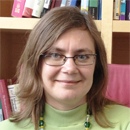Academic Editors
The following people constitute the Editorial Board of Academic Editors for PeerJ. These active academics are the Editors who seek peer reviewers, evaluate their responses, and make editorial decisions on each submission to the journal. Learn more about becoming an Editor.

Helmut Schroder
Helmut Schröder, PhD in Human Biology, Diploma in Nutritional Sciences, Specialist in Nutritional Epidemiology is Head of the Cardiovascular Epidemiology and Nutrition Research Group,
CIBER Epidemiology and Public Health, and
Senior Investigator of the IMIM- Hospital del Mar Medical Research Institute, Barcelona, Spain. His basic research interest is the analysis of lifestyle-disease relationships. This includes studies of the effects of nutrition on obesity and other cardiovascular risk factors. He is involved in several large epidemiological and clinical intervention studies.

Jana Vamosi
I am a biodiversity scientist examining the macroevolution, macroecology, community ecology, and conservation biology of plants. I often incorporate phylogenetic approaches to questions pertaining to the evolutionary ecology of plant-insect interactions.

Alessandro Frigeri
My research interest focuses on Planetary Science, Geoinformatics, and Geophysical data acquisition (both in the field and from remote sensing instruments), processing, and comparative analysis of datasets with different data models (e.g. topography, spectral and visible imagery and radar). I use and develop GIS tools for quantitative spatial analysis in my research activity.
I'm part of Scientific Teams of instruments onboard missions to Mars (ESA's Mars Express and NASA's MRO) and asteroids belt Vesta and Ceres (NASA's Dawn).

Charles Ofria
Professor of Computer Science at Michigan State University; Director of the Digital Evolution Laboratory and Deputy Director of the BEACON Center for the Study of Evolution in Action.
Charles Ofria director of the Digital Evolution Laboratory. He conducts research on evolution in artificial systems and applies the results to problems in computer science and evolutionary biology. He developed Avida, a software-based research platform consisting of populations of 'digital organisms used in biological research. His work has been published in Science and Nature and his research has received international media attention in forums such as Discover Magazine, National Geographic, CNN, the BBC, New Scientist, and the New York Times.

Gorka Bidegain
Gorka Bidegain (GB) is a Senior Lecturer of the University of the Basque Country at the Department of Applied Mathematics. His main research interests lie within marine ecological and population dynamics modelling, including disease ecology and pathogen transmission. He conducts laboratory/field experiments and uses advanced mathematical and computational ecological modelling techniques to identify and asses the population and ecosystem responses to pressures and ecological and environmental heterogeneities. GB is developing new models, methodologies and algorithms with implications for the understanding of how climate variability interacts with marine populations and host-pathogen systems.
GB has participated in more than 20 national and international R&D competitive projects including three EU projects and three National Science Foundation (NSF). GB has published more than 25 articles in top rank peer reviewed journals, 3 book chapters, several scientific/technical reports and open access computer codes and Graphical User Interface for disease modelling (R, Matalab).
He is member of the Ecology of Infectious Marine Diseases Research Coordination Network (EIMD-RCN) (Cornell University, USA). He is also member of the Marine Biological Association and the Estuarine and Coastal Sciences Association

Fabrice Not
I'm a staff researcher at CNRS-Station Biologique de Roscoff (France). As a biological oceanographer, my research interest focus on plankton ecology and evolution using genomics and microscopy approaches.
Kenneth Drinkwater
Dr. Kenneth Drinkwater is a Senior Lecturer at Manchester Metropolitan University.
His research areas include the following:
- Cognition: perceptual processing, statistical processing, and memory.
- Parapsychology (anomalous experiences, general belief, parapsychology, conspiracy theories)
His other areas of interest are:
- Older Adults & Neuropsychology (TBI/Head injuries/parkinson’s/epilepsy)
- IQ/Intelligence and ability measurement/testing
- Projective methods - Rorschach/thematic apperception tests
- Learning Disabilities (spectrum disorders/autism/asperger’s)

Maria Anisimova
Since 2014, senior research fellow and lecturer at the Institute of Applied Simulations of the Zurich University of Applied Sciences (ZHAW). Editor of BMC Evol Biol and PLoS ONE. In 2012 edited a book in 2 volumes "Evolutionary Genomics: Statistical and computational methods".

Albert HC Wong
Albert H.C. Wong is a neuroscientist and psychiatrist at the Centre for Addiction and Mental Health, and a Professor at the University of Toronto. He attended medical school at the University of Toronto, where he also completed specialty training in psychiatry and a PhD in neurobiology. Dr. Wong’s lab uses animal models and clinical studies to investigate genetic, epigenetic and developmental mechanisms of psychiatric disease. His areas of clinical expertise are in schizophrenia and brain stimulation.

Dunja Bruder
Dunja Bruder did her PhD thesis in immunology focussing on T cell responses to bacterial toxins (1996-1999) followed by a postdoc in the field of mucosal immunology at the HZI in Braunschweig (2000-2006). After several scientific stays abroad (Harvard Medical School; Yale University School of Medicine) she became head of the research group “Immune Regulation” at the HZI (2006). In addition, since 2011 Dunja Bruder is Professor for "Infection Immunology" at the University Hospital in Magdeburg.

Suzanna E. Lewis
Staff Scientist at Lawrence Berkeley National Laboratory. Fellow of the American Association for the Advancement of Science. Joint winner, American Association for the Advancement of Science Newcomb Cleveland Prize for best paper of the year: "The genome sequence of D. melanogaster."

Hannah S Mumby
Dr. Hannah Mumby is Assistant Professor within the School of Biological Sciences at the University of Hong Kong. Her research focuses on behavioural ecology, applications of animal and human behaviour to conservation and the conservation of large mammals. Dr. Mumby does interdisciplinary work using both natural and social science approaches to conservation science.

